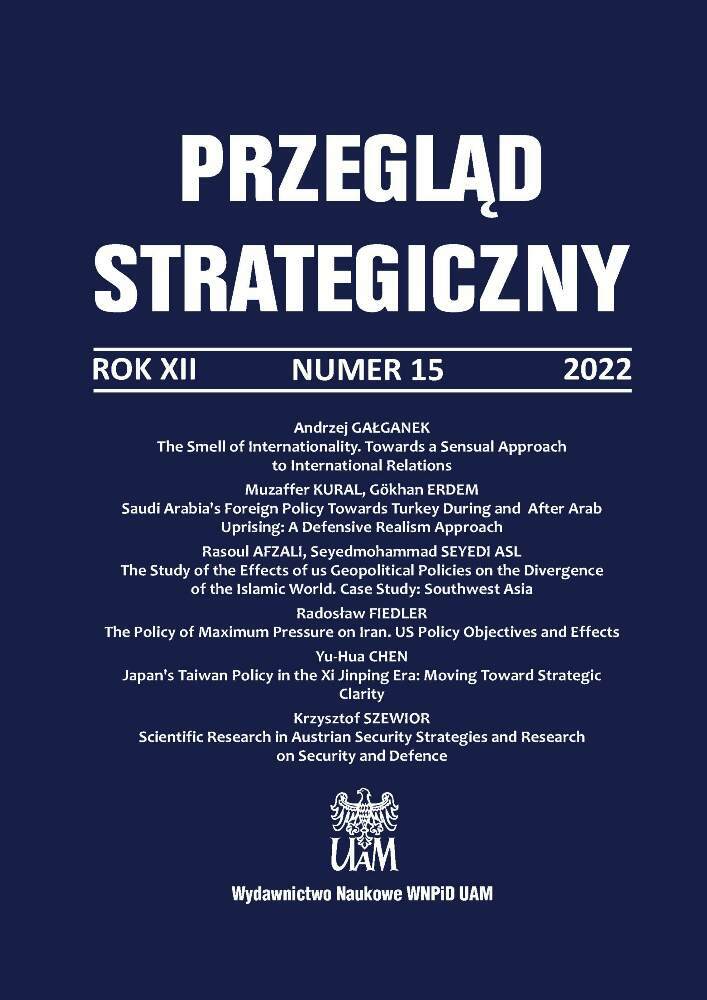Abstrakt
Celem artykułu jest udowodnienie, iż sprawność i skuteczność międzynarodowych organizacji pozarządowych (INGO) w zapewnianiu pokoju i bezpieczeństwa wymaga ścisłej współpracy z innymi podmiotami międzynarodowymi (międzynarodowymi organizacjami rządowymi, podmiotami pozarządowymi i instytucjami społeczeństwa obywatelskiego). W artykule dokonano analizy cech, modeli oraz problemów interakcji organizacji pozarządowych z innymi aktorami międzynarodowymi niezbędnymi w utrzymaniu pokoju, stabilności i bezpieczeństwa oraz rozwiązywaniu i zapobieganiu współczesnym wyzwaniom zagrażającym bezpieczeństwu systemu międzynarodowego. Taka interakcja i koordynacja wysiłków organizacji pozarządowych i innych aktorów międzynarodowych została ujęta przez pryzmat poszerzania obszarów kompetencji międzynarodowych organizacji pozarządowych i zwiększania ich aktywności w różnych obszarach. Podano przykłady aktywnego zaangażowania organizacji pozarządowych w działalność ONZ (i jej struktur), NATO, OBWE, Rady Europy oraz UE. W artykule przeanalizowano wyzwania jakie powstają w trakcie interakcji sektora rządowego i pozarządowego na arenie międzynarodowej. Podkreśla się, że międzynarodowe podmioty pozarządowe, będące (w większości) niezależne od swoich rządów i urzędników innych struktur międzynarodowych, mają możliwość szybkiego i skutecznego reagowania na strategiczne wyzwania bezpieczeństwa, informowania opinii publicznej i mobilizowania społeczności międzynarodowej do rozwiązywania problemów bezpieczeństwa na poziomie regionalnym i globalnym.
Bibliografia
Aall P. (1996), Nongovernmental Organisations and Peacemaking, in: Managing Global Chaos: Sources of and Responses to International Conflict, (eds.) A. Crocker, F. O. Hampson, P. Aall, United States Institute of Peace Press, Washington, D.C.
Binder M. (2008), The politicisation of international security institutions: The UN Security Council and NGOs, “WZB Discussion Paper”, No. SP IV 2008-305, https://www.econstor.eu/bitstream/10419/49745/1/614427312.pdf (02.10.2020).
Borgomano-Loup L. (2007), Improving NATO-NGO Relations in Crisis Response Operations, Rome, https://www.files.ethz.ch/isn/29914/FP2%20ENG.pdf (26.08.2021).
Bouget D., Prouteau L. (2002), National and Supranational Government-NGO Relations Antidiscrimination policy formation in the European Union, “Public Administration and Development”, Vol. 22: 33–38. https://doi.org/10.1002/pad.204 DOI: https://doi.org/10.1002/pad.204
Cherniavska L. N. (2005), Rol mizhnarodnykh neuriadovykh orhanizatsii u perebudovi politychnoi systemy svitu v umovakh hlobalizatsii, “Aktualni problemy mizhnarodnykh vidnosyn: zb. nauk. pr.”, Vol. 53: 95–104.
Council of Europe (2021), Yevropeiska molodizhna fundatsiia. Pidtrymka molodi v Yevropi, https://rm.coe.int/CoERMPublicCommonSearchServices/DisplayDCTMContent?documentId=0900001680471c01 (01.10.2021).
Dawisson Belеm L., Casarоes G. (2019), Can International Organisations Be Democratic? A Reassessment, “Contexto Internacional”, Vol. 41(03), Sep/Dec, https://doi.org/10.1590/S0102-8529.2019410300001. DOI: https://doi.org/10.1590/s0102-8529.2019410300001
De Tocqueville A. (1945), Democracy in America, Vintage Books, New York.
Dorosh L., Ivasechko O. (2018), The Problem of Reform of the UN Security Council Permanent Members’ Veto Right in the Context of Armed Conflict in the East of Ukraine, “Central European Journal of International and Security Studies”, Vol. 12, Issue 2. https://doi.org/10.1163/18750230-03001009
Dorosh L., Ivasechko O. (2019), The OSCE Institutional and Operational Possibilities in the Modern Conflict Resolution. By Example of the Activity of the OSCE Special Monitoring Mission to Ukraine, “Security and Human Rights”, No. 30: 1–22. DOI: https://doi.org/10.1163/18750230-03001009
European Youth Foundation (2021), What We are, https://www.coe.int/en/web/european-youth-foundation (12.09.2021).
Giegerich B. (2016), Hybrid Warfare and the Changing Character of Conflict, “JSTOR”, Vol. 15, No. 2: 65–72, https://www.jstor.org/stable/pdf/26326440.pdf (13.10.2021). https://doi.org/10.11610/Connections.15.2.05 DOI: https://doi.org/10.11610/Connections.15.2.05
Griffiths M., O’Callaghan T. (2002), International Relations: The Key Concepts, Routledge, London.
Koehler G. (2015), Seven decades of ‘development’, “Journal of International Development”, Vol. 27: 733–751, DOI: https://www.doi.org/10.1002/jid.3108. DOI: https://doi.org/10.1002/jid.3108
Lee J. (2006), Comparing NGO Influence in the EU and the U.S., “Centre for Applied Studies in International Negotiations”, Kigali, Rwanda, September: 4–5, https://css.ethz.ch/en/services/digital-library/publications/publication.html/25102 (12.10.2021).
Mayer P. (2008), Civil Society Participation in International Security Organizations: The Cases of NATO and the OSCE, in: Civil Society Participation in European and Global Governance. Transformations of the State, (eds) J. Steffek, C. Kisslin, P. Nan, Palgrave Macmillan, London, https://doi.org/10.1057/9780230592506_6. DOI: https://doi.org/10.1057/9780230592506_6
Mizhnarodni orhanizatsii (2007), Navch. posib. za red. Yu. H. Kozaka, V. V. Kovalevskoho, Z. Kutaini, Tsentr navch. lit-ry, Kyiv.
Moldovan peace dialogues: societal integration, accommodative policies and strategies, from an academic perspective: Studii internaţionale (2015), Coord. V. Teosa, C. Morari, col. red. V. Teosa et al., CEP USM, Chişinău.
OON (2021), Partnerskie svjazi, https://www.un.org/ru/sections/departments/department-global-communications/building-partnerships/index.html/ (02.08.2021).
OSCE (2016), Report by OSCE Special Representative and Coordinator for Combating Trafficking in Human Beings, Madina Jarbussynova, following her visit to the Republic of Tajikistan from 8 to 11 June 2015, https://www.osce.org/files/f/documents/1/1/252926.pdf (14.08.2021).
Paul J. A. (2020), NGOs and Global Policy-Making, June, https://archive.globalpolicy.org/ngos/intro/general/2000/anal00.htm (14.09.2021).
Pennock J. R. (1979), Democratic Political Theory, Princeton University Press, Princeton, New Jersey.
Pross A. P. (1992), Group Politics and Public Policy, Oxford University Press, Toronto.
Rebro D. (2019), Yak pysaty pro bizhentsiv i ne buty ksenofobamy, “MediaLab”, https://medialab.online/news/refugees/ (02.08.2021).
Richards J. P., Heard J. (2005), European Environmental NGOs: Issues, Resources and Strategies in Marine Campaigns, “Environmental Politics”, Vol. 14 (1): 26–38. https://doi.org/10.1080/0964401042000310169 DOI: https://doi.org/10.1080/0964401042000310169
Shivji I. J. (2007), Silences in NGO discourse: The role and future of NGOs in Africa, Fahamu, Oxford, UK, https://www.oozebap.org/biblio/pdf/2011/shivji_forweb.pdf (02.10.2020).
UIHL (2021), Ninth International Forum of NGOs In Official Partnership With UNESCO “Another Perspective on Migration”, https://www.uinl.org/en_GB/-/9eme-forum-des-ong-en-partenariat-officiel-avec-l-unesco-un-autre-regard-sur-les-migrations-humaines-#p_73_INSTANCE_g4QgRSEIbf0Q (02.09.2021).
UNESCO (2021), Directives concerning UNESCO’s partnership with non-governmental organizations, http://portal.unesco.org/en/ev.php-URL_ID=48884&URL_DO=DO_TOPIC&URL_SECTION=201.html (02.10.2021).
Union of International Associations (2021), Yearbook of International Organizations, https://uia.org/yearbook (26.08.2021).
USAID (2019b), USAID And The Aga Khan Foundation Work To Increase The Impact of Local Organizations in Central Asia, https://www.usaid.gov/news-information/press-releases/dec-2-2019-usaid-and-aga-khan-foundation-work-increase-impact-local-organizations (12.09.2021).
Warleigh A. (2000), The Hustle: Citizenship Practice, NGOs and ‘Policy Coalitions’ in the European Union – The Cases of Auto Oil, Drinking Water and Unit Pricing, “Journal of European Public Policy”, Vol. 7, No. 2: 230–237. https://doi.org/10.1080/135017600343179 DOI: https://doi.org/10.1080/135017600343179
Weiss T., Jolly R. (2009), The “third” United Nations, “UN Intellectual History Project. Brief Note”, No. 3, http://www.unhistory.org/briefing/3ThirdUN.pdf (22.09.2021).
Weiss T. G., Carayannis T., Jolly R. (2009), The “Third” United Nations, “Global Governance”, Vol. 15: 123–142. https://doi.org/10.1163/19426720-01501008 DOI: https://doi.org/10.1163/19426720-01501008
Yeremieieva I. A. (2019), Teoriia mizhnarodnykh vidnosyn: navchalnyi kontent, Dnipropetrovskyi derzh. un-t vnutrishnikh sprav, Dnipro.
Licencja
Prawa autorskie (c) 2022 Oksana Kruchinina, Lesia Dorosh, Uliana Ilnytska

Utwór dostępny jest na licencji Creative Commons Uznanie autorstwa 4.0 Międzynarodowe.

